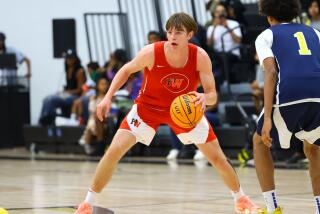SAN DIEGO COLLEGE NOTEBOOK : UCSD Players Took Long Drop When They Went Down Under
- Share via
Tom Marshall, the men’s basketball coach at UC San Diego, expects his players to be able to jump, but on a recent trip to New Zealand and Australia, the Tritons went a bit overboard.
Guard Joe Lindsay got the bug first. Then one-by-one, he convinced teammates, Marshall and even Lindsay’s 51-year-old mother to go bungee jumping.
That’s right, bungee jumping . And these guys are supposed to be highly educated.
“Joe started it all, and by the time the trip was over, the entire team had gone, including the coaching staff, including Joe’s mom (Millie). Our team doctor even went and did it,” Marshall said. “I’m not sure if it’s something I’d do again, but it was fun.”
Marshall said that a crane device with a large bucket attached hoisted jumpers out over a cliff with a body of water some 150 feet below. The rest was up to the individual and a 120-foot bungee cord.
Said Marshall, who did some parachuting in the Army: “It’s a little different in that you don’t have that feeling of security strapped around your chest.”
From a basketball standpoint, UCSD’s trip was eventful, too. The Tritons won five of six games. Tim Rapp averaged 25.5 points per game, Gordon McNeill 13.3 and Rick Batt 12.8.
“Both Gordon and Tim probably set themselves up to go back and play professionally when they’re through with college,” Marshall said. “They’ve already been told they have contracts awaiting them if they want to play there.”
This was the third time in six years Marshall has taken UCSD players overseas. In 1987, the Tritons went to Sweden and Denmark. In 1984, UCSD made history by becoming the first American team allowed inside the Guongdong Province of China.
“That one was fun,” Marshall said “Some of (the Chinese) had never seen people with blond hair before. But it was scary, too. We weren’t used to walking around where everyone had an Uzi.”
Mira Mesa graduate Mike Picotte left last week for UCLA, where he has a partial four-year swimming scholarship. According to his mother, Suzy, Picotte has been training all summer and was particularly happy to swim against Mark Spitz, who won seven gold medals in the 1972 Olympics and is staging a comeback for the Games in 1992, when he will be 42.
“He was so excited,” she said. “He beat Mark in two workouts.”
But Picotte, the defending national short-course champion in the 200-meter freestyle, needs to work on his distance swimming. At the La Jolla Rough Water Swim Sept. 9, Picotte didn’t participate.
“He was afraid he couldn’t make the mile-swim in rough water,” Suzy said with a grin.
She added that her son has been promised a full scholarship if he finishes in the top eight in his middle-distance freestyle events at the NCAA championships.
Sue Chen, the University of San Diego’s top woman cross-country runner the past two years, is stationed on the Mercy, a 250-bed Navy hospital ship in the Persian Gulf. Chen, 38, a Navy nurse for 17 years, attended USD the past two years to work on a bachelor of science degree in nursing.
There’s a sequel to The Night the Lights Went Out in Torero Stadium. Just six days after shutting down for 30 minutes before USD’s football game with Occidental Sept. 8, the lights again went out. This time, it was during a USD-Washington soccer match. The delay was about 17 minutes.
Football Coach Brian Fogarty said electricians believe they located and solved the problem after the second incident. A main breaker appeared to have shorted out, causing the whole system to overload.
Staff writer Kim Q. Berkshire contributed to this report.
More to Read
Go beyond the scoreboard
Get the latest on L.A.'s teams in the daily Sports Report newsletter.
You may occasionally receive promotional content from the Los Angeles Times.










